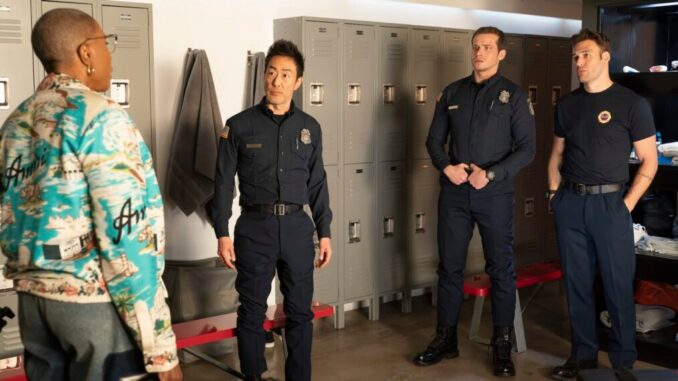
When 9-1-1’s evil scientist, Moira Blake (Bridget Regan), set the lab fire that trapped most of the 118 in quarantine during Contagion, it at first seemed like Chimney was the one in danger. The comedic relief character quickly started displaying symptoms of CCHF (Crimean-Congo hemorrhagic fever) after the lab explosion, and the first episode in the two-part thriller left off on a cliffhanger that promised Chimney’s condition would only worsen. 9-1-1 season 8, episode 15 turns the tables completely by curing Chimney and evacuating the 118, only for Bobby to reveal at the last second that he also contracted CCHF.
Bobby’s confession frustratingly left no time for action, and the main character died soon after saying one last goodbye to Athena. Initially, Bobby’s death felt purely for the sake of shock value, and many believed it was an elaborate ruse that would be backpedaled on by the end of season 8. Sadly, the fire captain’s fate was sealed at the end of 9-1-1 season 8, episode 18, when Chimney and Maddie (Jennifer Love Hewitt) welcomed their second child and named him Bobby Nash Han, cementing the fallen fire captain as a heroic martyr figure for the procedural.
Let’s get real for a second—when Bobby Nash died in Season 8 of 9-1-1, it wasn’t just a plot twist. It was a gut punch. Fans didn’t just feel surprised. They felt betrayed. And even now, weeks (or months) later, that emotional scar still burns hot across Reddit threads, Twitter rants, and fan blogs.
Let’s dig into why Bobby’s death hit so hard, what the writers were possibly thinking, and how this one moment might change the future of the show forever.
The Shocking Twist No One Saw Coming
A Beloved Character Cut Short
From Day 1, Bobby Nash wasn’t just another firehouse captain. He was the backbone, the moral compass, the calm in the chaos. His journey—from redemption to leadership—made him irreplaceable.
So when Season 8 decided to rip him away, fans weren’t ready. And frankly? Neither was the show.
H2: The Episode That Changed Everything
The twist came in Season 8, Episode 3, during what seemed like a routine emergency call. A sudden explosion. A body. A silence that followed felt heavier than any scene the show had ever delivered.
The Fan Backlash Was Immediate—and Loud
Social Media Erupted
Minutes after the episode aired, #BobbyDeservedBetter trended on Twitter. TikTok edits, emotional reactions, and even tear-filled YouTube tributes went viral.
Fans Called It “Lazy Writing”
Many longtime viewers called the twist unearned, lazy, and disrespectful to the character’s arc. A common sentiment? “We stuck around for 8 seasons, and this is how he goes out?”
Did The Writers Go Too Far?
Subverting Expectations vs. Emotional Payoff
There’s a thin line between shocking your audience and alienating them. Killing Bobby may have been “bold,” but was it meaningful? For many, it lacked proper build-up or emotional closure.
Was It About Ratings?
Some fans speculate it was all about creating buzz to spike ratings. It worked… but at what cost?
Declining Viewer Trust in Long-Running Shows
Is 9-1-1 Falling into the Same Trap as Other Dramas?
Shows like Grey’s Anatomy, The Walking Dead, and even Game of Thrones all share one thing: audience betrayal through character deaths. Is 9-1-1 just the next in line?
Bobby’s Legacy—What He Meant to the Show
A Character Rooted in Redemption
Bobby wasn’t perfect. That’s what made him lovable. His struggles with alcoholism, guilt, and grief made his victories feel earned. Taking that away felt like ripping out the show’s soul.
More Than a Firefighter
He was a mentor, a father figure, and the emotional glue of the firehouse. His quiet strength held the team together, especially in its darkest hours.
Breaking Down the Writers’ Intent (Maybe?)
Could This Be a Misdirection?
Fan theories are wild right now. Some believe Bobby isn’t actually dead. A coma? A hallucination? A fake-out death like in Sherlock?
Let’s face it: We’ve seen stranger things.
Or Was It Just Closure?
Some say Bobby’s arc had peaked. Maybe the writers felt it was time. But killing him mid-season instead of giving him a proper goodbye still stings.
How Bobby’s Death Impacts the Team
Chaos at Station 118
Without Bobby, the leadership vacuum is real. The team dynamics shift—sometimes awkwardly. The grief is palpable, but does it strengthen or break them?
Who Steps Up?
Will Chimney take the reins? Or Buck? Both have leadership qualities, but Bobby’s presence was something else entirely.
Actor Peter Krause’s Role—On or Off the Set?
Was It His Choice to Leave?
Rumors swirl about Peter Krause wanting to pursue other projects. Could this have been a planned exit? Or was it the network pulling strings?
No Official Statement Yet
As of now, no formal exit statement from Krause. That silence? It speaks volumes.
What This Means for Season 9
Rebuilding or Falling Apart?
Can the show maintain its emotional weight without Bobby? Or will it start to crumble like others before it?
Fan Loyalty is on the Line
If the writers can’t deliver a compelling arc post-Bobby, don’t be surprised if fans start walking away.

Fixing the Damage—Can 9-1-1 Recover?
Bring Closure, Not Confusion
If Bobby’s death sticks, fans need real closure. Letters, flashbacks, legacy moments—something.
Time to Refocus on Heartfelt Storytelling
Less shock, more soul. That’s what made 9-1-1 great in the first place.
The Silver Lining? Maybe It Sparks Change
Sometimes, fan anger is a sign of deep emotional investment. The showrunners now have a unique opportunity: to either repair or ruin the trust they’ve built over eight seasons.
Conclusion: A Death That Still Echoes
Whether you loved Bobby, saw him as the backbone of 9-1-1, or just respected the emotional weight he carried, his death cut deep. And honestly? Fans aren’t wrong to be upset.
Bobby Nash wasn’t just a character. He was the heart of the show. His loss isn’t something viewers will “get over” by next week’s episode.
If 9-1-1 wants to survive, it’s going to have to do more than explain his death—it needs to honor it. Not with clichés. Not with temporary grief. But with genuine storytelling that treats viewers not just like an audience… but like part of the family Bobby helped build.